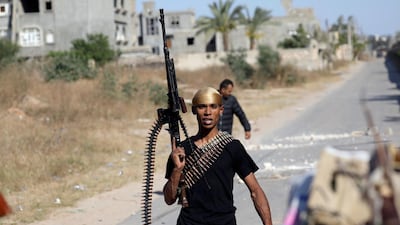Warring parties in Libya could be prosecuted if evidence is found that they committed atrocities, the head of the International Criminal Court warned on Wednesday.
And Fatou Bensouda urged the UN Security Council to convey that message to both sides.
Ms Bensouda said the ICC was closely monitoring the situation, including the recent fighting south of Tripoli between Field Marshal Khalifa Haftar's Libyan National Army and militias loyal to the rival Government of National Accord.
Meanwhile, French President Emmanuel Macron called for a ceasefire after talks with Fayez Al Sarraj, Libya's internationally recognised prime minister.
The US and German representatives to the UN also called for a ceasefire during Wednesday's council session in New York.
ICC staff are gathering evidence to establish if crimes within its remit were committed near the capital and elsewhere, Mrs Bensouda, the court's chief prosecutor, told council members.
“Where a commander knew, or should have known, that their subordinates were committing or about to commit crimes, and failed to take all necessary and reasonable measures within his or her power to prevent or repress such crimes, the commander may be held criminally responsible,” she said.
“My office stands ready to investigate and, where appropriate, to prosecute any persons or party to the ongoing armed conflict should they engage in conduct constituting a crime within the jurisdiction of the ICC.
“The suffering of the Libyan people must stop. The rules of international humanitarian law must be fully respected.
"Perpetrators of atrocity crimes will be held individually criminally responsible.”
Almost five weeks of battles on the southern outskirts of Tripoli have killed at least 432 people, wounded 2,069 and displaced about 55,000 others, the UN says.
Libya has been mired in chaos since the removal and killing of longtime dictator Muammar Qaddafi in 2011.
The GNA rules in Tripoli but Field Marshal Haftar supports a rival administration in the east of the country.
Ambassador Jonathan Cohen, the acting US permanent representative to the UN, said the LNA and the GNA should “rapidly return to UN-brokered mediation”.
“A ceasefire is needed. Future abuses, will not be tolerated,” Mr Cohen said.
The US has not signed the international court's governing statute.
Mr Cohen said that although the ICC recently ruled out prosecution against American military personnel in Afghanistan, “we remain concerned” about the UN-backed court's role.
Germany's permanent representative to the UN said that Libya's years of instability and the most recent fighting showed that the ICC was “more important than ever”.
“We defend it against all threats,” ambassador Christoph Heusgen said.

